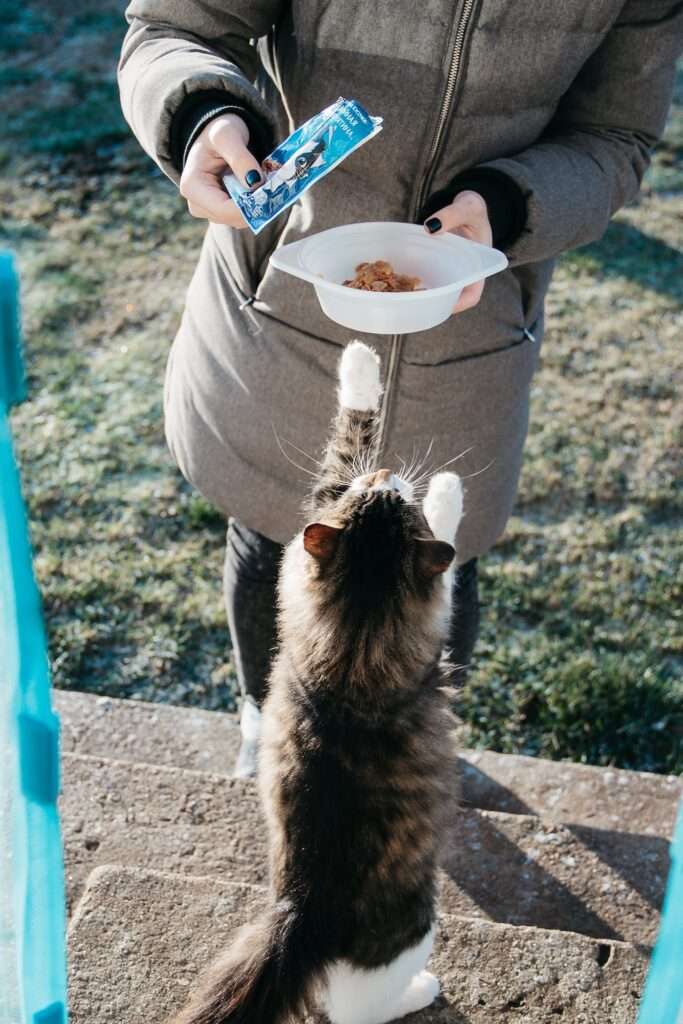Why Is My Cat Throwing Up Undigested Food? The Ultimate Guide to a Healthy Feline
Welcome, fellow cat lovers! If you’ve ever found yourself wondering why your feline friend is throwing up undigested food, you’re not alone. This is a common issue among cats, and one that can have a variety of causes.
As a pet owner, it’s important to understand the underlying reasons behind this behavior so that you can take appropriate action and help your cat feel better. In this blog post, we’ll explore the possible reasons why a cat might vomit undigested food and offer some solutions for concerned cat owners.
What is Undigested Food?
Before we dive into why your cat might be vomiting undigested food, it’s important to understand what we mean by “undigested food.” When a cat eats, their digestive system goes to work breaking down the food so that the nutrients can be absorbed into the body.
The food is first broken down mechanically in the mouth by chewing, and then further broken down chemically by enzymes in the stomach and intestines. When the food has been fully broken down and the nutrients have been absorbed, what’s left is waste material that is excreted from the body.
What is Regurgitation?
Unlike vomiting, which is an active process that involves the forceful expulsion of stomach contents, regurgitation is a passive process that occurs when undigested food is brought back up from the esophagus and into the mouth. This can result in the appearance of whole pieces of food or a tubular shape, which may resemble feces.
Regurgitation can be caused by a variety of factors, including eating too quickly, hairballs, gastrointestinal issues, and foreign objects in the digestive tract. In some cases, it may also be a sign of a more serious underlying health condition that requires prompt veterinary attention. Now that we have a basic understanding of what regurgitation is, let’s take a closer look at the common causes of this behavior in cats.
Why Is My Cat Throwing Up Food?
As we mentioned earlier, there are a variety of factors that can contribute to regurgitation in cats. Let’s take a closer look at some of the most common causes:
- Eating Too Quickly: Cats that eat too quickly may swallow large pieces of food that can become lodged in their esophagus, causing them to regurgitate the undigested portions.
- Hairballs: Cats are meticulous groomers, and in the process of grooming themselves, they may ingest a significant amount of fur. This fur can accumulate in their digestive tract, leading to the formation of hairballs. When these hairballs become large enough to obstruct the esophagus, they can trigger regurgitation.
- Gastrointestinal Issues: Cats with gastrointestinal issues, such as gastroesophageal reflux disease (GERD), may experience regurgitation as a result of the muscle at the base of the esophagus failing to close properly.
- Foreign Objects: Cats may also regurgitate as a result of ingesting foreign objects such as toys or string that have become lodged in their esophagus or digestive tract.
When to See a Vet
While regurgitation is a common behavior among cats, it can also be a sign of a more serious underlying health issue. As a pet owner, it’s important to know when to seek veterinary attention for your cat. Here are some signs that may indicate your cat needs medical attention:
- Chronic regurgitation: If your cat is regurgitating on a regular basis, this could be a sign of a more serious underlying issue that requires veterinary attention.
- Blood in vomit or regurgitated material: Blood in vomit or regurgitated material is always a cause for concern and warrants an immediate visit to the vet.
- Weight loss: If your cat is regurgitating and experiencing weight loss, this could be a sign of a more serious underlying condition that requires prompt attention.
- Difficulty breathing: If your cat is experiencing difficulty breathing, this could be a sign of a severe esophageal obstruction that requires immediate medical attention.
In the next section, we’ll discuss the diagnostic tests that veterinarians may use to identify the underlying cause of regurgitation in cats.
Diagnostic Tests for Regurgitation
If you suspect that your cat is regurgitating due to an underlying health issue, it’s important to take them to the vet for an evaluation. Your vet may recommend one or more diagnostic tests to help identify the root cause of the problem. These tests may include:
- Blood work: Blood work can help identify any abnormalities in your cat’s blood chemistry that may be contributing to their regurgitation.
- X-rays: X-rays can help your vet identify any foreign objects or abnormalities in your cat’s digestive tract that may be causing regurgitation.
- Endoscopy: Endoscopy involves inserting a small camera into your cat’s esophagus and digestive tract to identify any abnormalities or obstructions.
- Barium swallow: A barium swallow involves administering a contrast material to your cat and then taking X-rays to identify any abnormalities or obstructions in their digestive tract.
Treatment Options for Regurgitation
The treatment options for regurgitation in cats will depend on the underlying cause of the problem. Here are some common treatments:
- Feeding changes: If your cat is regurgitating due to eating too quickly, your vet may recommend feeding them smaller, more frequent meals or using a slow-feed bowl to help slow down their eating.
- Hairball prevention: To prevent hairballs, your vet may recommend regular grooming or a specialized diet.
- Medications: If your cat is regurgitating due to gastrointestinal issues or GERD, your vet may prescribe medications to help reduce inflammation or acid production in the stomach.
- Surgery: In severe cases, surgery may be necessary to remove obstructions or correct abnormalities in your cat’s digestive tract.
In some cases, regurgitation may be a chronic issue that requires ongoing management. Your vet will work with you to develop a treatment plan that is tailored to your cat’s specific needs.
Home Remedies and Prevention

While it’s important to seek veterinary attention for your cat if they are experiencing regurgitation, there are also some steps you can take at home to help prevent the problem from occurring. Here are a few tips:
- Feed your cat smaller, more frequent meals to prevent them from eating too quickly.
- Use a slow-feed bowl to help slow down your cat’s eating.
- Ensure your cat stays hydrated by providing it with enough water to drink.
- Groom your cat regularly to help prevent hairballs from forming.
- Switching to a high-quality, easily digestible cat food.
- Keep foreign objects out of your cat’s reach to prevent them from ingesting items that could cause obstructions.
- Monitor your cat’s weight and seek veterinary attention if you notice any significant changes.
Conclusion
Regurgitation is a common behavior among cats that can be caused by a variety of factors, including eating too quickly, hairballs, gastrointestinal issues, and foreign objects. By understanding how your cat’s digestive system works and taking preventative measures, such as feeding smaller, more frequent meals and using slow feeder bowls, you can help reduce the likelihood of your cat vomiting undigested food.
If your cat continues to vomit undigested food or shows signs of illness, it’s important to seek veterinary care. Your veterinarian can help determine if there are any underlying health problems that need to be addressed and provide appropriate treatment.
Remember, as a cat owner, it’s important to be attentive to your cat’s health and behavior. By working with your veterinarian and taking proactive measures to maintain your cat’s health, you can help ensure that your feline friend lives a happy and healthy life.
Frequently Asked Questions
Q: Why is my cat throwing up undigested food?
A: Regurgitation can be caused by a variety of factors, including eating too quickly, hairballs, gastrointestinal issues, and foreign objects in the digestive tract. In some cases, it may also be a sign of a more serious underlying health condition that requires prompt veterinary attention.
Q: How can I prevent my cat from throwing up undigested food?
A: To prevent regurgitation, you can try feeding your cat smaller, more frequent meals, providing hairball remedies, and ensuring that your cat does not have access to foreign objects that could be ingested. If the problem persists, it is best to consult with your veterinarian to rule out any underlying health issues.
Q: What should I do if my cat is throwing up undigested food frequently?
A: If your cat is frequently throwing up undigested food, it is important to consult with your veterinarian to determine the underlying cause and appropriate treatment. Your veterinarian may recommend a change in diet, medication, or other interventions based on the specific cause of the problem.
Q: Is it normal for cats to throw up undigested food?
A: Occasional regurgitation of undigested food is normal for cats, especially if they eat too quickly or ingest hairballs. However, frequent regurgitation can be a sign of an underlying health issue.
Q: What are some other signs of a health issue that could be causing my cat to throw up undigested food?
A: In addition to regurgitation, other signs of a health issue in cats may include lethargy, loss of appetite, weight loss, diarrhea, or constipation. If you notice any of these symptoms, it is important to consult with your veterinarian.
Q: Can certain cat food brands cause cats to throw up undigested food?
A: Some cats may be sensitive to certain ingredients in their food, which can cause regurgitation. It is important to choose a high-quality cat food that is appropriate for your cat’s age, breed, and health needs.
Q: Can stress or anxiety cause cats to throw up undigested food?
A: Yes, stress and anxiety can cause gastrointestinal upset in cats, which can lead to regurgitation. If you suspect that stress or anxiety is causing your cat’s regurgitation, it is important to address the underlying cause and provide your cat with a calm and comfortable environment.
Q: Are there any home remedies that can help prevent cats from throwing up undigested food?
A: Some home remedies that may help prevent regurgitation in cats include feeding smaller, more frequent meals, providing hairball remedies, and ensuring that your cat has access to plenty of fresh water. However, it is important to consult with your veterinarian before trying any home remedies.
Q: Can overfeeding cause cats to throw up undigested food?
A: Yes, overfeeding can cause cats to eat too quickly, which can lead to regurgitation. It is important to feed your cat appropriate portion sizes and to monitor their eating habits.
Q: When should I take my cat to the veterinarian for regurgitation?
A: If your cat is frequently regurgitating undigested food, or if they are showing other signs of a health issue, it is important to consult with your veterinarian. Your veterinarian can perform a physical exam, run diagnostic tests, and recommend appropriate treatment based on the underlying cause of the regurgitation. Additionally, if your cat is showing signs of distress or discomfort, it is important to seek veterinary attention right away.





